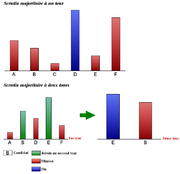- First past the post
-
Scrutin uninominal majoritaire à un tour
Article principal : Système électoral.Parmi les systèmes électoraux, le scrutin uninominal majoritaire à un tour est le vote le plus simple que l'on puisse rencontrer.
L'électeur doit choisir un candidat parmi plusieurs. On compte alors le nombre de voix obtenues par chaque candidat. Celui qui recueille le plus de voix (majorité relative) remporte les élections.
Utilisation
Ce système de vote est utilisé pour l'élection du président de la république dans certains pays (Mexique, Kenya, Philippines, Zambie, Corée du Sud, Malawi, Islande, Zimbabwe, Togo, États-Unis).
On le retrouve aussi lors d'élections parlementaires ou législatives dans le vote par circonscriptions comme au Royaume-Uni et au Canada .
Avantage et inconvénient
L'extrême simplicité de ce vote permet une mise en place économique.
Cependant, elle permet l'élection d'un représentant qui peut se révéler minoritaire (une majorité d'électeurs ayant voté "contre" lui, ou n'ayant pas voté pour lui).
Exemple : Lors d'une élection, le candidat A recueille 25% des voix, le candidat B 20 % des voix, le candidat C 19 % des voix, le candidat D 18 % des voix et le candidat E 18 % des voix. Le candidat A est élu avec 75% des électeurs dans l'opposition.
Ce fut le cas par exemple en 1993 au Venezuela, alors que Rafael Caldera a été élu à la présidence avec 30,5 % du vote populaire. Il en fut de même aux élections de mai 1992, où Fidel Ramos, le Président des Philippines, a été élu, dans une lutte qui l'opposait à six autres candidats, avec seulement 24 % des suffrages exprimés.
Un autre exemple, où voici les choix des électeurs (d'une population de 13) par ordre de préférence :
- 5 électeurs choisissent A (1er choix) puis B puis C,
- 4 électeurs choisissent B puis C puis A,
- 4 électeurs choisissent C puis B puis A.
Avec ce système, A est élu même si 8 des 13 électeurs lui préfèrent B et 8 des 13 électeurs lui préfèrent C.
C'est la raison pour laquelle on préfère souvent un scrutin uninominal majoritaire à deux tours, ou un autre système de vote pondéré.
Lien externe
Catégorie : Système électoral
Wikimedia Foundation. 2010.

